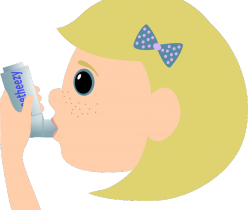Fresh fruits and vegetables are full of antioxidants which may improve your respiratory system health and manage asthma. Aim to eat a well-balanced diet that includes enough fish oil to help avoid asthma attacks.
Eat well to breathe well
It’s no secret that a well-balanced diet keeps you overall healthy including your lungs. Eating the right foods with the right amount of nutrients can provide you enough energy to stay active throughout the day, supports your immune system to fight against infections and disease. the right nutrients in your diet can help you breathe easier by minimizing asthma symptoms. there is no specific diet for asthma, but there are foods choices you can make to support your lung function following the asthma medicines recommended by your doctor.
How diet is related to Asthma?
it is believed that a good diet is a crucial part of your overall asthma treatment. Being overweight or obese may increase your risk of getting severe asthma, so it is important to improve your dietary patterns and to maintain a healthy weight. Researchers suggest that what you eat has a direct impact on your lung function and asthma. According to various research studies, people who eat foods that are rich in vitamin C, flavonoids, selenium, magnesium, beta carotene, and omega 3 fatty acids are less likely to have asthma attacks. These foods have a high number of antioxidants that helps protect skin cells from damage. Those who do not include enough amount of colorful fruits and green vegetables in their diet are more likely to experience poor lung function. Studies also suggest that those who eat more fruits such as apple, grapes, tomatoes, and nuts are less likely to get asthma symptoms.
Dietary tips for preventing asthma
As mentioned above, there is no specific diet for asthma that your health care specialist r may recommend you stop the progression of asthma. But it is always a good choice to pick healthy and nutritious foods to avoid worsening of asthma. Create a healthy serving plate Try at every meal, emphasizing more eating fresh fruits, green vegetables, enough proteins, and vitamins to stay active through physical activity. Follow these tips good to breathe well and avoid asthma symptoms:
- Eat Omega 3s- Include foods rich in omega 3 fatty acids, the essential fatty acids are majorly found in fish like tuna, salmon, and sardines. Vegetarians can go with Plant sources such as flaxseeds that are extremely beneficial for overall health. However, no evidence proves the benefits of omega 3 fatty acids for asthma patients, but it’s still a good choice to include in your diet.
- Include more fruits and vegetables in your diet- It is still not known what those specific fruits and vegetables that might reduce asthma are, so the best advice is to add as much as a wide variety of them.
- Avoid high caloric food items- Eating more calories that you may be able to burn contributes to weight gain. This is bad not only for your general health but also for your asthma. Studies suggest that obese people are more likely to experience severe asthma symptoms. In the same studies, such people were found to take more medicines for asthma and miss more work than people who maintain a healthy weight.
Also Read: Can Drinking Alcohol Trigger an Asthma Attack
- Do not consider trans fats and omega 6 fatty acids- According to some research studies, eating trans fats and omega 6 fatty acids may worsen asthma. Processed foods and margarine come under these food categories. Such food can cause serious health condition such as heart problems.
- Say no to preservatives- Sulphites that are generally used to keep food fresh and to inhibit the growth of old can trigger temporary asthma symptoms such as coughing wheezing and breathing difficulties. Sulfur dioxide produces by sulfites can irritate your lungs. However, the use of sulphite in fruits and vegetables is no longer considered, but they are still used in many processed foods dried fruits, canned wines, and other food items.
- Keep an eye on food allergies- Many people have food intolerances such as lactose intolerance, but these are not considered as true allergies and rarely causes or worsen asthma symptoms. Very few people with asthma have true food allergies to eggs, milk, peanuts, shellfish, and other foods. If you have asthma, then exposing to even a small amount of food to which you are allergic to can cause life-threatening symptoms such as shortness of breath and severe wheezing that required immediate asthma medication.
To manage asthma, it is always a good idea to consult your health care specialist before making any crucial dietary changes. Depending on your asthma diagnosis, your health care provider might give you specific dietary advice followed by medicines for asthma to improve your condition and stop the disease progression.




